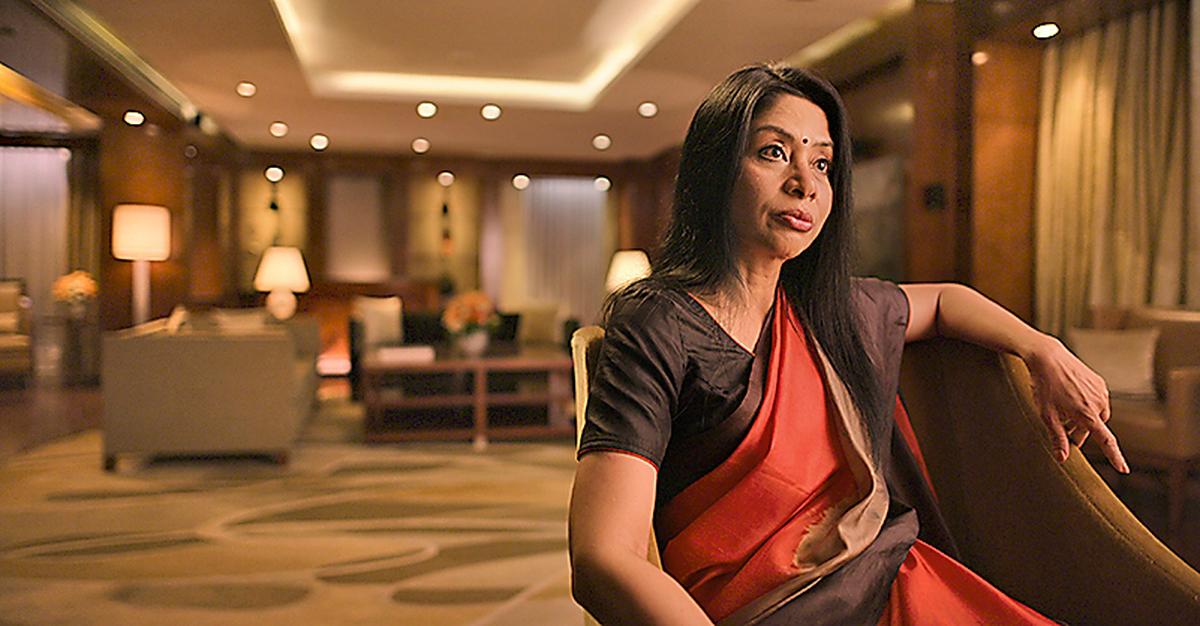
In May 2022, after spending more than six years in jail for allegedly murdering her daughter, Indrani Mukerjea secured bail. | Photo Credit: Illustration by Soumyadip Sinha
You know who is living her best life? Indrani Mukerjea, that’s who. On April 29, she celebrated International Dance Day by performing a classic waltz with choreographer Sandip Soparrkar. A couple of days before that, she was on a news channel talking about new perspectives in life and societal norms. Mukerjea is in high demand and she is very busy.
In May 2022, after spending more than six years in jail for allegedly murdering her daughter, Sheena Bora, Mukerjea secured bail. Since then, she has written a book, starred in a Netflix series about her life, given TEDx talks, has been the chief guest at college functions, and speaker at literature festivals and media conclaves. She has also been spending time doing glamorous photoshoots and has found her “true calling” in dance. She records all of these accomplishments in great detail on her Instagram page, where she has 1.6 million followers, and her posts receive thousands of ‘likes’ with people commenting about how inspiring she is.

Manipulating the narrative
I must confess that even as a person who has lived long enough now to expect that anything is possible, I did not realise I’d see a day when thousands of people would find Mukerjea “inspiring”. This is a woman who for years passed her daughter (and son) off as her “siblings”, and who later emerged as the prime suspect in the murder of her own child. A lot of adjectives spring to mind, but ‘inspiring’ is not one of them. To be clear, Mukerjea’s high-profile current life is not an example of a person re-integrating into society after bearing out the punishment for a crime. She has not been acquitted of the charges of murder, she is merely out on bail. And yet, she seems to be sashaying into college auditoriums and five-star convention centres to loud cheers. I could not find a video of what she spoke to the students of Mumbai’s K.C. College about, but in her Instagram post of the event, Mukerjea wrote that she was “emphasizing upon the spirit of participation. Because sometimes the journey itself is the destination”. I don’t know what kind of career aspirations students of the college have, but traversing the road to Arthur Road Jail is unlikely to be in their top five choices. Yet, right underneath this caption, someone has commented, “Ur persona has impressed me to the core.”

Still from the Netflix series The Indrani Mukerjea Story: Buried Truth | Photo Credit: Courtesy of Netflix
While it is one (mildly deplorable) thing to be intrigued by the life of a person accused of a heinous crime, it is quite another to be impressed or inspired by them. Mukerjea, who is clearly a master communicator, has cast her narrative in the language of feminism; she says people are envious of her success, that while she was called a social climber, any man in her place would have been applauded as being “ambitious”. This is a shrewd move, because she is using a common trope that many women have faced and utilising that to shield her from any scrutiny or criticism.

Greed vs. morality
More importantly, Mukerjea has seized on the fact that publishing houses and television production companies often allow greed to trump over any moral compass they might have and has sold her story to the highest bidders. In the West, laws commonly known as the Son of Sam law are designed to prohibit criminals from profiting from their crimes. Famously, the footballer O.J. Simpson (who was acquitted of the charges of murdering his wife and her friend, Ron Goldman) was asked to hand over the rights of his book, If I Did it: Confessions of the Killer (2007), to the family of Goldman. In India, we have no such law. The Central Bureau of Investigation had filed a case asking for a stay on Mukerjea’s Netflix series, but the court ruled that it found nothing prejudicial that could cause concern in the ongoing trial of the murder of Sheena Bora.

After pointedly ignoring the content machinery churning out Indrani Mukerjea juice, I must confess that I too finally succumbed and watched this ‘court-approved’ show. It is a window into a deeply dysfunctional family, and since her ex-husband, Peter, and his family did not participate in the show, we are left only with life lessons from Mukerjea herself, her daughter and an estranged son, who she had not only passed off as her brother but had also committed to a psychiatric facility.
Mukerjea is out of jail, freshly divorced and has homes in Spain and Bristol, as well as a painting by Pablo Picasso, as a part of her settlement. She says a lot of things on the show, her eyes gleaming, about herself, her life, her difficulties, her successes. The one thing she doesn’t express is sadness about the death of her own child.
I came away from the show feeling, in many ways, violated. But clearly, I am part of a minority here. Mukerjea’s popularity is the true reflection of how society feels about her. We live in a time when fame and notoriety are all mixed up and followership is everything, and in this milieu, Mukerjea is a star. On Instagram, she often refers to herself as a “phoenix”, rising from the ashes. The cult of Indrani Mukerjea will likely rise further. The shame of that is on us.
The writer is the author of Independence Day: A People’s History.

